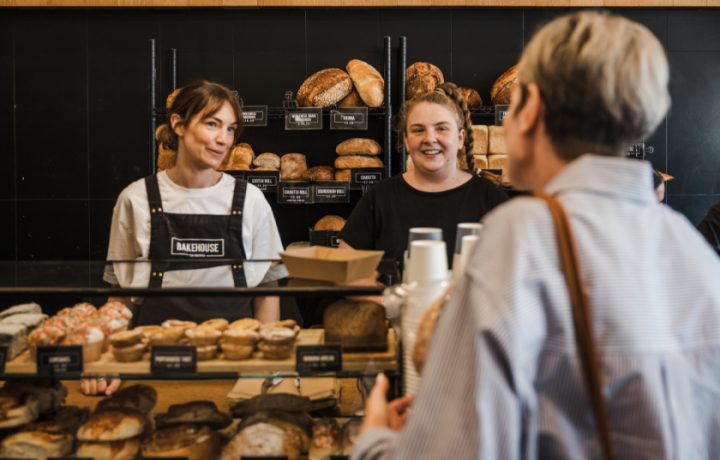“A Godsend”: Supported homeownership transforms lives for those with intellectual disabilities

Posted on
In a nationwide housing crisis, safe and affordable rentals are almost completely inaccessible to people on Disability Support Pensions—and homeownership might as well be totally off the cards. This Canberra-based nonprofit is working to change the game.
Project Independence is a not-for-profit organisation with 30 properties across Canberra, Sydney and Melbourne, providing affordable housing to people living with intellectual disabilities. In a national first, Project Independence has launched a supported homeownership model that allows residents to gradually build equity in a property using their Disability Support Pension. In May, Project Independence’s Phillip development saw several of its residents officially sign homeownership deeds—a huge achievement for the residents.
For one of the new homeowners, 33-year-old Ellie Leechman, it means independence like she’s never had before. Ellie’s mother, Rae Leechman, was with her when she signed the deed.
Ellie has been living at Project Independence for two years now and is thrilled to finally own her own home. Ellie feels nervous but excited, she says. She’s looking forward to “just living independently and…actually having my own place so I can [decide] how I want it and who can…and can’t come in.”
She’s keen to make improvements—more blinds and cupboard space are on her to-do list.
But her plans also rest in simply continuing to enjoy the beautiful environment at Project Independence.
“Being there, and just being in the community…is really great. I still get support and independence as well.”

Ellie making cupcakes.
The program comes at a critical moment in Australian history—in the nationwide housing crisis, people with intellectual disabilities are at an incredible disadvantage securing housing. This year’s Anglicare Rental Affordability Snapshot found that of the 51,238 rental listings surveyed, just 25 were affordable for people on the Disability Support Pension.
“Ellie and other people [with intellectual disabilities] get kicked right to the bottom now,” says Rae. “They can’t compete for rental assistance, nothing like that.”
“My husband and I never used to sleep well worrying about her future, but now we sleep really well.”
Now that she organises her own transportation and calendar, Ellie is so busy with work, social events, and competitive ten-pin bowling that her parents have to ring ahead so that Ellie can schedule them into her diary!
A lot of Project Independence residents are “the last people at home,” says Rae, so the program opens up a new community outside their parents’ circles. They hold regular events like games nights and Christmas parties, and everyone comes together on weekday nights for a shared meal. Residents also have the opportunity to take cooking classes—last week, Ellie made roasted tomato soup with cheese toasties.
“They all look after each other,” says Rae.
Ellie says that Project Independence “is like one big family.”
Ellie has always been involved in spaces for people with intellectual disabilities, including the 2007 Special Olympics swimming team and a supported class at college, so now she’s pleased to be living with people she’s known all her life.
Ellie doesn’t compete in the Special Olympics anymore—she’s too busy now.
“I achieved what I wanted in it anyway, and that’s coming home from China with a silver medal and a gold medal.”
She also works four days a week in the Department of Education. She’s recently been told that she has accumulated 21 weeks’ worth of annual leave, and has had to organise a leave plan.
“That’s what she gives,” says Rae, “to not only her little community, but also to the ACT community.”
Programs like Project Independence help to even the playing field for people with intellectual disabilities, providing for the basic needs of safety and security which are too often denied to vulnerable people. With Project Independence, Ellie can pursue her own personal and professional goals, contributing valuably to the spaces in which she exists.
Ellie’s main aspiration, however, is to be happy—and ultimately, isn’t it everyone’s? And doesn’t everyone have a right to it?
And if a resident finds that Project Independence isn’t right for them, they will get their money back, says Rae.
“It’s all worked through the Disability Support Pension…to live here and pay [Project Independence]. … It’s all within achievability for someone who’s on a Disability Support Pension.”
“This really is the beginning of homeownership for [Ellie].”
Rae and Terry, Ellie’s father, have “provided her with a start,” and if she chooses to leave in the future, she can get her money back and put a deposit on a new place.
Rae says that she and Terry were “tearful” watching Ellie sign the deed.
“This option was like a godsend…In 90 per cent of the cases it would be what people would desire for their child.”
To other parents of children with intellectual disabilities, Ray and Terry would like to say, “Have a look at what this opportunity would provide for your child. We feel it is a way of life that offers self-development, community living, independence and problem solving all in a protected environment. The real highlight of this model is the financial stability and homeownership outcome.”
To other people with intellectual disabilities navigating housing, Ellie says, “Give it a go…I know it’s hard, but just don’t give up.”
For more information about Project Independence, visit projectindependence.com.au

